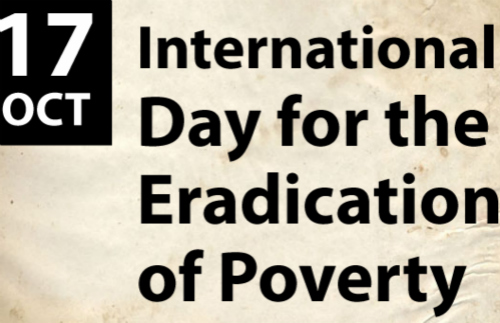
Message from Ms. Audrey Azoulay, Director-General of UNESCO, on the Occasion of the International Day for the Eradication of Poverty文章源自英文巴士-https://www.en84.com/5983.html
联合国教科文组织总干事奥德蕾·阿祖莱女士消除贫穷国际日致辞文章源自英文巴士-https://www.en84.com/5983.html
文章源自英文巴士-https://www.en84.com/5983.html
17 October 2018文章源自英文巴士-https://www.en84.com/5983.html
2018年10月17日文章源自英文巴士-https://www.en84.com/5983.html
文章源自英文巴士-https://www.en84.com/5983.html
“Poverty does not belong in civilized human society. Its proper place is in a museum” according to Muhammad Yunus of Bangladesh, one of the inventors of micro-credit and winner of the 2006 Nobel Peace Prize for his commitment to the most disadvantaged populations.文章源自英文巴士-https://www.en84.com/5983.html
文章源自英文巴士-https://www.en84.com/5983.html
“贫穷属于博物馆,不属于文明的人类社会。”来自孟加拉的穆罕默德·尤努斯如是说。他是小额信贷的发明人之一,因致力于帮助最弱势群体而荣获2006年诺贝尔和平奖。文章源自英文巴士-https://www.en84.com/5983.html
文章源自英文巴士-https://www.en84.com/5983.html
Since the 1990s, considerable progress has been made globally to curb poverty and destitution and, as a result, more than one billion people have been lifted out of extreme poverty. These spectacular results are a source of satisfaction and hope but should not obscure the remaining challenges. Today, an estimated 635 million people still live in extreme poverty, which is more than 8% of the world’s population. The vast majority live in South Asia and Sub-Saharan Africa.
自20世纪90年代以来,减少苦难与贫穷的工作在全球取得了巨大进展:超过十亿人因此摆脱赤贫。这些显著成果令人感到满意与希望,但我们不能因此忽视仍待应对的挑战。如今,据估计有6.35亿人仍然生活在赤贫中,占比超过世界总人口的8%。其中绝大部分人生活在南亚和撒哈拉以南非洲地区。
Poverty is a problem related not only to financial resources but also to lack of opportunity. Poverty eradication is the first Sustainable Development Goal of the United Nations 2030 Agenda for Sustainable Development. It is, however, closely linked to other goals such as ensuring good health and hygiene conditions, access to quality education for all, opportunities for decent employment, gender equality and preservation of the environment.
贫穷不仅是资金问题,也是缺乏机遇的问题。消除贫穷是联合国2030年可持续发展议程的第一个目标,但它也与其他目标紧密相关,如确保良好卫生条件、全民获得优质教育、从事体面工作、性别平等或保护环境。
Economic growth must be more inclusive and help to foster sustainable employment. It is essential that each country provide social protection for its citizens to protect them from the many socioeconomic uncertainties in a changing world. Education is a powerful tool for development: it is crucial that every child – boy or girl – receive 12 years of basic education.
经济增长必须得到更好的分享,并有助于创造可持续就业机会。每个国家都应确保向其公民提供社会保障,使他们在这个不断变化的世界中避免遭受大量社会经济风险。教育是发展的重要杠杆,所有儿童,无论男女,都应接受12年基础教育。
Education should address issues related to health, sexuality, gender equality and sustainable development in order to break the vicious circle of social customs and collective perceptions that perpetuate inequality. UNESCO, the lead United Nations agency for education, particularly focuses its efforts on girls’ education as a driving force for peace and development.
教育应当纳入有关健康、性、性别平等和可持续发展的问题,以打破使不平等持续存在的社会习俗和集体表象的恶性循环。教科文组织作为教育领域的联合国牵头机构,尤其重视开展女童教育,这是发展与和平的真正动力。
On this International Day and in this seventieth anniversary year of the Universal Declaration of Human Rights, let us rally together to ensure that each and every person in the world may enjoy decent living conditions.
值此国际日和《世界人权宣言》70周年之际,让我们行动起来,使全世界每一个人都能享受有尊严的生存条件。
俄文、法文、西文、阿文版:https://pan.baidu.com/s/1PTg0ff8lvaa95zaERJv-EQ

